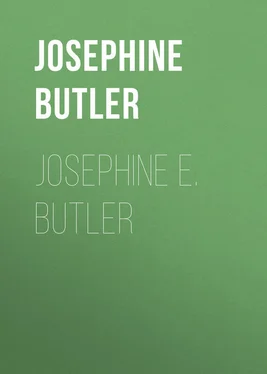Josephine Butler - Josephine E. Butler
Здесь есть возможность читать онлайн «Josephine Butler - Josephine E. Butler» — ознакомительный отрывок электронной книги совершенно бесплатно, а после прочтения отрывка купить полную версию. В некоторых случаях можно слушать аудио, скачать через торрент в формате fb2 и присутствует краткое содержание. Жанр: foreign_antique, foreign_prose, на английском языке. Описание произведения, (предисловие) а так же отзывы посетителей доступны на портале библиотеки ЛибКат.
- Название:Josephine E. Butler
- Автор:
- Жанр:
- Год:неизвестен
- ISBN:нет данных
- Рейтинг книги:5 / 5. Голосов: 1
-
Избранное:Добавить в избранное
- Отзывы:
-
Ваша оценка:
- 100
- 1
- 2
- 3
- 4
- 5
Josephine E. Butler: краткое содержание, описание и аннотация
Предлагаем к чтению аннотацию, описание, краткое содержание или предисловие (зависит от того, что написал сам автор книги «Josephine E. Butler»). Если вы не нашли необходимую информацию о книге — напишите в комментариях, мы постараемся отыскать её.
Josephine E. Butler — читать онлайн ознакомительный отрывок
Ниже представлен текст книги, разбитый по страницам. Система сохранения места последней прочитанной страницы, позволяет с удобством читать онлайн бесплатно книгу «Josephine E. Butler», без необходимости каждый раз заново искать на чём Вы остановились. Поставьте закладку, и сможете в любой момент перейти на страницу, на которой закончили чтение.
Интервал:
Закладка:
But school life was not all play for George Butler. He showed an early aptitude for scholarship, gaining among several prizes that for Greek Iambics. In the autumn of 1838 George went up to Trinity College, Cambridge. During the year he spent at Cambridge the sense of duty and of responsibility for the use of opportunities and gifts which he possessed lay dormant within him. Those who loved him best often thanked God, however, as he did himself in later life, that he had escaped the contamination of certain influences which leave a stain upon the soul, and sometimes tend to give a serious warp to the judgment of a man in regard to moral questions. A remarkable native purity of mind, and a loyal and reverent feeling towards women, saved him from associations and actions which, had he ever yielded to them, would have been a bitter memory to such a man as he was. In the interval between leaving Cambridge and going to Oxford he spent several months in the house of Mr. Augustus Short (afterwards Bishop of Adelaide). It was while under his roof that he imbibed a true love of work, and learned the enjoyment of overcoming difficulties, and of a steady effort, without pause, towards a definite goal.
One of his life-long and most valued friends, the Rev. Cowley Powles, writes: “It was, I think, in 1841 that Butler got the Hertford Scholarship. I remember meeting him just after his success had been announced. I was coming back from a ride, and he stopped me and said: ‘I have got the Hertford.’ The announcement was made in his quietest voice, and with no elation of manner, though his countenance showed how much he was pleased. Never was there a man with less brag about him.” In 1843 George Butler took his degree, having obtained a first class. He kept up his connection very closely with Oxford for four years, making use of the time for various studies, and taking pupils or reading parties during the long vacations. In 1848 he was appointed to a Tutorship at the University of Durham, which he retained for a little more than two years. It was during the latter part of his residence there that I first made his acquaintance.
The following, written after our engagement, shows his extreme honesty of character, while it indicates in some faint degree his just and unselfish view of what the marriage relation should be; namely, a perfectly equal union, with absolute freedom on both sides for personal initiative in thought and action and for individual development.
“I do not ask you to write oftener. I would have you follow the dictates of your own heart in this; but be always certain that whatever comes from you is thrice welcome. I write because I feel it to be necessary to my happiness. I have lately written to you out of the fulness of my heart, when my soul was deeply moved to strive after a higher life. But often my letters will be about trifling matters, so that you may be tempted to say, ‘Why write at all?’ Yet, after all, life is largely made up of trifles. Moreover, I do not wish to invest myself in borrowed plumes. I do not want you to find out later that I am much like other people, perhaps even more commonplace than most. I would rather your eyes were opened at once. I cannot reproach myself with ever having assumed a character not my own to you or to anyone. Such impostures are always too deeply purchased by the loss of self-respect. But I fear that you may have formed too high an estimate of my character – one to which I can never come up; and for your sake I would wish to remove every veil and obstacle which might prevent your seeing me just as I am. If I were only to write to you when my better feelings were wrought upon, you might think me much better than I am, so I will write to you on every subject and in every mood. Those lines which I sent to you gave no exaggerated picture. I have often felt in a very different spirit to that in which we should say ‘Our Father.’ The praying for particular blessings, which is enjoined by the words of the Lord Jesus, ‘Ask, and ye shall receive,’ has appeared to me at times as derogatory to the omniscient and all-provident character of God. Can He, I have thought, alter the smallest of His dispensations at the request of such a weak and insignificant being as I am? This vain philosophy, the offspring of intellectual pride, has had more to do with blighting my faith than wilful sin or the world’s breath! But though I have ‘wandered out of the way in the wilderness,’ I do not despair of taking possession of the promised land. You say you can do so little for me. Will it be little, Josephine, if, urged by your encouragement and example, I put off the works of darkness and put on the armour of light? Blessings from the Giver of all blessings fall upon you for the joy you have given to me, for the new life to which you have called me! I should think it undue presumption in me to suggest anything to you in regard to your life and duties. He who has hitherto guided your steps will continue to do so. Believe me, I value the expression of your confidence and affection above ‘pearls and precious stones’; but I must not suffer myself to be dazzled, or to fancy that I have within me that power of judging and acting aright which would alone authorise me to point out to you any path in which you ought to walk. I am more content to leave you to walk by yourself in the path you shall choose; but I know that I do not leave you alone and unsupported, for His arm will guide, strengthen and protect you. I only pray, then, that you may be more and more conformed to the image of Him who set us a perfect example, and that He will dispose my heart to love and admire most those things in you which are most admirable and lovely.”
During the years 1848-49 the Dean of Peterborough frequently wrote to his son expressing his desire to see him turning his mind towards the ministry – hoping that he would decide on taking orders. The Dean was sincerely convinced that there was nothing which ought to make his son hesitate to take so serious a step, and that the duties of a clergyman would have a beneficial effect on his character, tending to his highest good and happiness. That, however, was far from being his son’s view of the matter. While appreciating his father’s motives in urging him in this direction, and replying in general terms with a gentle courtesy, he seems to have felt convinced that it was impossible for him to follow his advice in the matter. Finally he wrote: “I thank you, my dear father, for your welcome letter. I think I have already told you that I have no internal call to, nor inclination for, the Church. On the contrary, I should feel I was guilty of a wrong action if I embarked in any work or profession for neither the theoretical nor the practical part of which I had any taste. And if this be true of ordinary professions, is it not so in a tenfold degree in the case of the Church? I feel at present no attraction towards the study of dogmatical theology, or any branch of study in which a clergyman should be versed; and I cannot get over the scruples I have against such a step as you advise. I am at present engaged, usefully I hope, in a place of Christian education, closely connected with a cathedral church, with abundant opportunities of adding to my stock of knowledge in various subjects, as well as of imparting to others what I know. I do not see, at present, any necessity for planning any change in my mode of life.”
How was it then, it may be asked, that he did actually elect to become a clergyman some six years later? The answer is, he had gradually become convinced that the work of his life was to be educational, and the desire arose in his mind to be able to stand towards the younger men or boys who should come under his care in the position of their pastor as well as their teacher. He weighed the matter gravely for a long time before becoming a clergyman; but after having taken the step, he never repented of having done so. To the end of his life, however, his character continued to be essentially that of a layman. In 1851 he wrote: —
Читать дальшеИнтервал:
Закладка:
Похожие книги на «Josephine E. Butler»
Представляем Вашему вниманию похожие книги на «Josephine E. Butler» списком для выбора. Мы отобрали схожую по названию и смыслу литературу в надежде предоставить читателям больше вариантов отыскать новые, интересные, ещё непрочитанные произведения.
Обсуждение, отзывы о книге «Josephine E. Butler» и просто собственные мнения читателей. Оставьте ваши комментарии, напишите, что Вы думаете о произведении, его смысле или главных героях. Укажите что конкретно понравилось, а что нет, и почему Вы так считаете.












